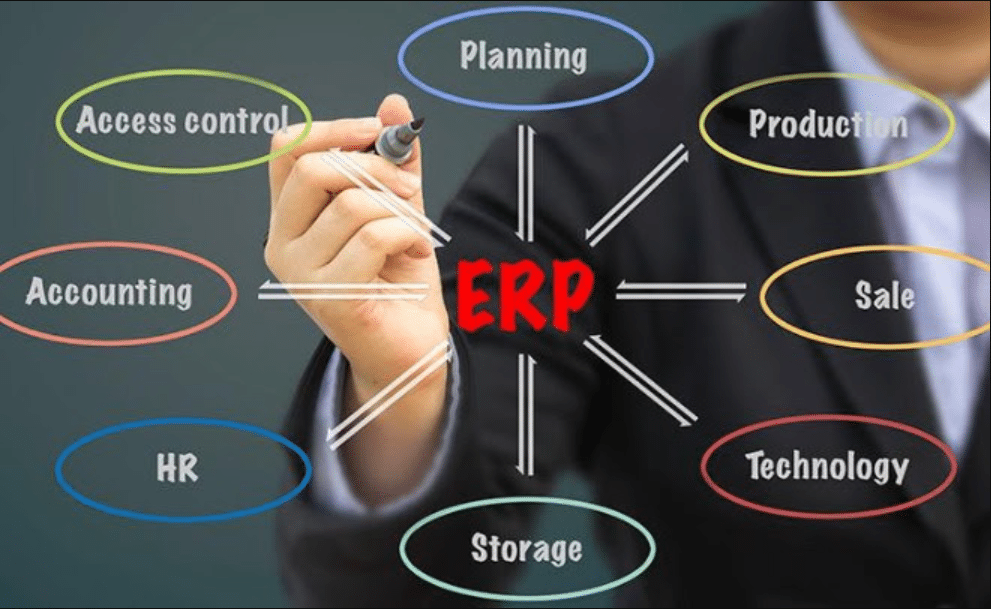ERP Solutions – In today’s intricate business milieu, Enterprise Resource Planning (ERP) solutions are pivotal. They merge disparate corporate activities into a singular, streamlined platform. This discourse delves into ERP solutions’ essential elements and their transformative effects on enterprise management.
ERP Solutions
Essential ERP Solution Elements and Modules
Financial Oversight
ERP solutions boast comprehensive financial oversight modules, encompassing accounts payable/receivable, budgeting, and fiscal reporting, ensuring financial activities’ precision and clarity.
Workforce Administration
The Workforce Administration facet of ERP solutions oversees employee records, remuneration, performance reviews, and training, centralizing and simplifying HR functions for more effective personnel management.
Supply Chain Optimization
ERP’s Supply Chain Optimization module refines procurement, production scheduling, and stock control, bolstering supply chain transparency and synergy, curtailing lead times, and diminishing operational expenses.
Business Benefits of ERP Solutions
Process Unification
ERP solutions unify business processes, integrating varied operations into a unified entity, enhancing efficiency, curtailing manual mishaps, and boosting productivity.
Data Precision
By centralizing data stewardship, ERP solutions reduce data redundancy and inconsistencies, sharpen data precision, and furnish leaders with trustworthy insights for strategic maneuvers.
Informed Decision-Making
With their real-time data access and exhaustive reporting mechanisms, ERP solutions empower leaders, offering a deep dive into business facets for savvy decision-making and strategic foresight.
ERP Solutions’ Integration Proficiencies
Interdepartmental Cohesion
ERP solutions dismantle departmental barriers, ensuring seamless interdepartmental integration, cultivating collaboration, improving dialogue, and presenting a comprehensive organizational perspective.
Cooperative Tools
Embedded cooperative tools within ERP solutions promote team interaction and unity. Shared schedules, document stewardship, and project oversight enhance a collaborative corporate atmosphere.
ERP Solution Deployment Guidelines
Comprehensive Requirement Analysis
An exhaustive requirement analysis is paramount prior to ERP solution deployment. Understanding the business’s unique demands guarantees the selected solution’s alignment with corporate objectives.
Extensive User Training
The success of ERP solution implementation is anchored in extensive user training, which ensures proficiency in the solution’s features, eases change resistance, and optimizes its advantages.
ERP Solution Implementation Hurdles and Resolutions
Data Transitioning Hurdles
Data transitioning can present obstacles in ERP solution implementation. A detailed data transitioning strategy and partnership with seasoned consultants are vital in navigating these challenges and securing a fluid transition.
Embracing Change in ERP Implementation
Navigating the waters of change is a known challenge during ERP adoption. Transparent dialogue, stakeholder engagement, and consistent support are crucial to surmounting this obstacle.
ERP Success Chronicles
Case Analysis: Company W’s Operational Renaissance
Company W, a global entity, underwent a remarkable operational renaissance by integrating an ERP system, achieving a 30% surge in operational efficiency across financial, human resources, and supply chain sectors.
The Road Ahead for ERP Systems
Cloud-Driven ERP Evolution
The trajectory of ERP systems is steering towards cloud-driven solutions, offering unparalleled access, scalability, and adaptability to meet the demands of the ever-changing tech landscape.
AI and Automation: The Vanguard of ERP
Artificial intelligence and automation are set to redefine ERP systems, bolstering data analysis, streamlining routine tasks, and fostering more ingenious decision-making processes.
Selecting the Optimal ERP System
Industry-Specific ERP Considerations
Opting for an ERP system tailored to specific industry demands ensures peak performance, addressing each sector’s unique challenges and necessities.
Growth-Ready and Adaptable ERP Solutions
An ideal ERP system grows with your business and remains adaptable to shifting corporate needs, promising a solution that matures alongside your enterprise.
ERP Versus Other Business Tools
ERP and CRM: A Comparative Look
ERP systems provide a bird’s-eye view of business management, while Customer Relationship Management (CRM) hones in on customer engagement. Each serves distinct objectives, yet they share common ground in functionality.
ERP Against MRP
Material Requirements Planning (MRP) zeroes in on production and inventory, whereas ERP offers a broader lens on business operations. The choice pivots on your organization’s specific requirements.
Understanding ERP Pricing Structures
Subscription-Based ERP Frameworks
ERP systems typically adopt a subscription-based pricing strategy, granting businesses the flexibility to scale based on their operational scope and eliminating hefty initial costs.
Customization Costs Under the Microscope
The foundational subscription encompasses the essentials, but tailor-made modifications might incur additional costs. Open conversations with ERP providers are crucial to demystify any potential extra expenses.
Fortifying Business with ERP Security Protocols
Encrypting the Essentials
Data encryption is at the heart of ERP systems, a critical safeguard that locks away sensitive details from prying eyes.
Access Tailored by Role
ERP systems employ meticulous role-based access, fine-tuning user permissions to ensure access meets role-specific necessities.
Commendations and Critiques from Users
Applauding User Experience
ERP systems are often lauded for their intuitive interfaces and comprehensive capabilities, with their centralizing and collaborative prowess earning particular praise.
Constructive Calls for Progress
Users frequently point out the need for ongoing enhancements in training and user interfaces, with ERP vendors’ dedication to these areas promising continuous improvements.
ERP in Action Across Industries
Manufacturing Efficiency via ERP
In manufacturing, ERP systems are pivotal in refining production schedules, inventory management, and resource distribution.
Service Sector Streamlining with ERP
For service-oriented businesses, ERP systems are instrumental in project management, financial streamlining, and elevating service delivery, leading to greater client contentment and operational effectiveness.
Summing Up ERP’s Impact
In essence, ERP systems are transformative agents in business, delivering a comprehensive management approach. They stand out as invaluable allies, streamlining operations and sharpening decision-making in today’s competitive business environment.
Frequently Asked Questions
1. Is ERP software suitable for small businesses?
- Yes, many ERP programs offer scalability, making them suitable for businesses of all sizes.
2. How long does it take to implement an ERP program?
- Implementation times vary, but thorough planning and training can expedite the process.
3. Can ERP programs be customized to fit unique business processes?
- Yes, ERP programs are often customizable to align with specific business requirements.
4. What sets ERP programs apart from other business management solutions?
- ERP programs offer a comprehensive suite of tools covering various business functions, providing a holistic approach to management.
5. How does ERP software address security concerns?
- ERP software employs data encryption and role-based access control to ensure robust security measures.

